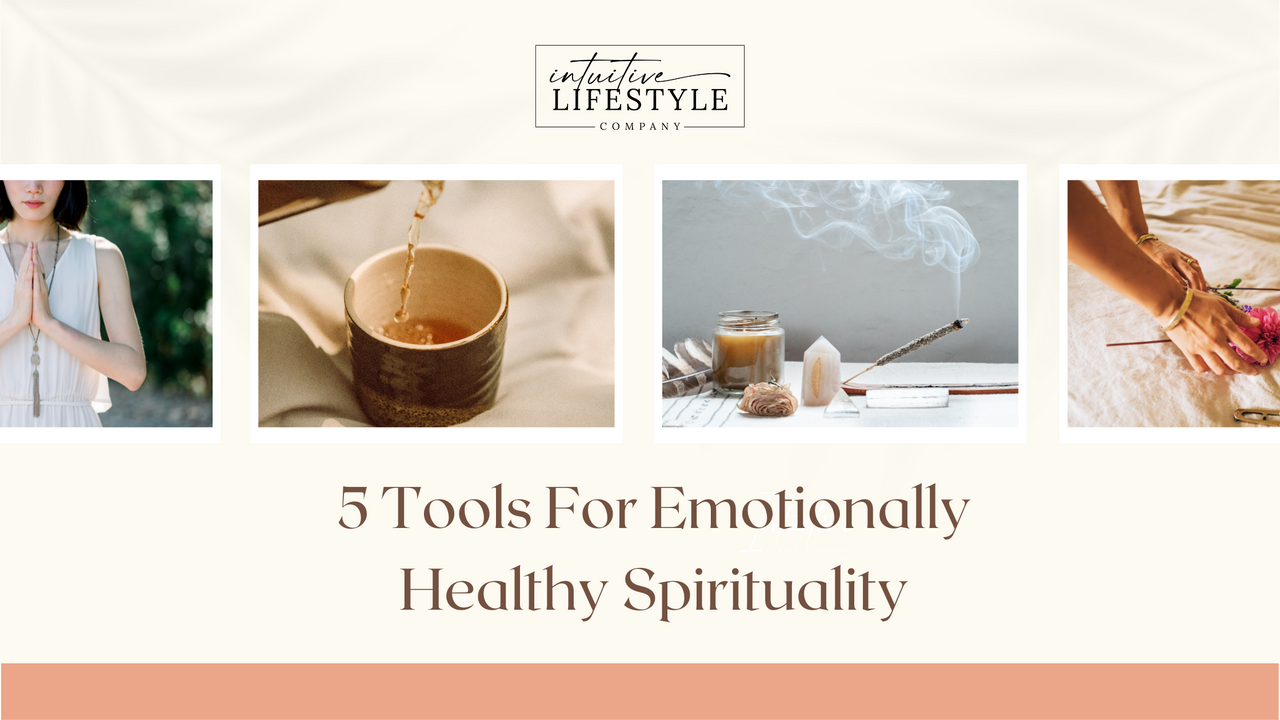5 Tools For Emotionally Healthy Spirituality
Nov 15, 2021
5 Tools For Emotionally Healthy Spirituality

Finding solace in spirituality has gained popularity in recent years. More and more people are waking up to the benefits of searching for meaningful connections outside of themselves. But moving from a focus on material things to a more spiritual path can be a tumultuous transition. It’s impossible to be spiritually healthy without looking inwards first, developing a maturity of emotion to balance the deep fulfillment of spiritual healing. This is why it’s so important to find an emotionally healthy spirituality, one that is expressed by your most authentic self.
To do this, there are five important practices to consider. Incorporating these into your daily routine and lifestyle will help you embrace spirituality in an emotionally healthy way, surrendering to limitations while taking control of the new, empowered version of yourself.
Practicing Meditation and Mindfulness
One of the most crucial tools for emotionally healthy spirituality is daily meditation and mindfulness. Meditation is an ancient art used all around the globe to establish a deeper connection to the self, soul, and everything beyond. Just five to ten minutes every morning can bring huge benefits, including emotional and mental clarity, stability, and stress reduction. It gives you the chance to put aside time to reflect inwards while embracing the new spiritual path you are destined to walk.
Meanwhile, mindfulness is something that should be practiced more often. It’s about re-training the mind to be fully present in each moment, committing to ourselves right there and then without being concerned by the past, future, or other irrelevant details.
The best way to start practicing mindfulness is by inserting short pauses into your everyday routine. In these little moments, realign your mind to the present, and notice just how much sharper your focus becomes. Fretting about what has gone before or what is next to come only brings anxiety. Practicing mindfulness helps us stay grounded, living a life with intent.
Honoring Your Healing
Sometimes, it can be hard to see how far you have come down the spiritual path already. Our inner critic is quick to jump in and tell us we’re not good enough or we’re not doing enough. It’s important to balance this inner voice with another, one that honors and acknowledges the steps that have already been taken.
Achieving spiritual healing and growth is not a simple flick of a switch. It takes time, practice, and patience. There is no perfect path and the place you are at right now is the place you were always meant to be. Try to remember this when that inner critic chimes in.
Creating a Non-Negotiable Spiritual Practice

A non-negotiable spiritual practice is a promise you make to yourself. It’s a commitment to your spiritual journey, one that should not be broken under any circumstances. The practice you choose is completely up to you, but it should be something you can achieve no matter what life throws at you. Taking a moment to set out your daily intentions and affirmations is a good place to start, as it can be done from anywhere and is an easy commitment to make.
You could also consider gratitude journaling, yoga, meditation, or ‘grounding’ which is the process of going outside daily without your shoes to feel the Earth beneath your toes. Whatever you choose, protect your energy by practicing it with intention every single day. Accept that perfection isn’t the goal but know that by sticking to your intention, you’ll be developing an even deeper sense of your most authentic self. You can continue to add to your practices as you grow, fitting them around your lifestyle.
Practicing Forgiveness
Finding peace, with yourself and your spirituality, cannot be achieved without first making peace with those around you. It’s not easy, but it’s the only way we truly heal. Any grudge or lingering resentment is likely to hinder your spiritual growth, cloud your judgment, and prevent you from truly understanding yourself.
So, how to practice forgiveness? First, understand that forgiveness does not mean you accept or disregard the perpetrator’s misgivings. It is about looking inwards to yourself, and making a conscious choice to unburden yourself from the pain it has caused you.
Start by acknowledging this pain and figuring out what you need to overcome it. Pinpoint the emotions you are feeling and talk about them with a close friend or counselor, or document them in your journal. Remember that you’re not alone, have patience with yourself, and find meaning and strength in the act of moving forward.
Making Personal and Spiritual Growth Part of Your Life

To be emotionally healthy spiritually, we have to embrace spiritual and personal growth in every aspect of our lives. Otherwise, we will lack direction on our journey and soon feel overwhelmed. Understanding how to do this can be difficult, but there are plenty of resources out there to help you.
The Intuitive Life Society has developed a program of support to help you start living with intention and intuition, with mentoring, workshops, classes, and a community of like-minded individuals to help you embrace spirituality at every turn. This includes breathwork classes, yoga, tailored personal development, intuitive cooking, and more, helping you access a deeper power within yourself.
Find out more here.
MORE FREE RESOURCES FOR YOUR JOURNEY:
Follow me on Instagram: @intuitivelifestyleco
Listen to the podcast: Intuitive Souls Podcast
GRAB MY LIST OF MY FAVORITE TOOLS AND EXERCISES TO STRENGTHEN YOUR INTUITION